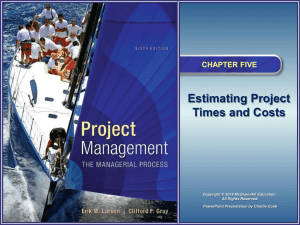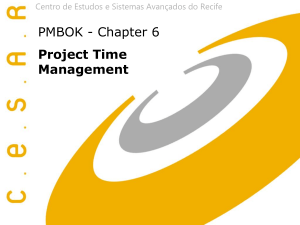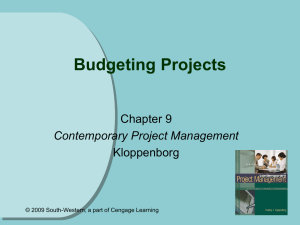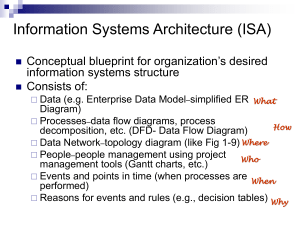"Estimation, agile/practical project work", Fredrik Bach - BEKK
advertisement
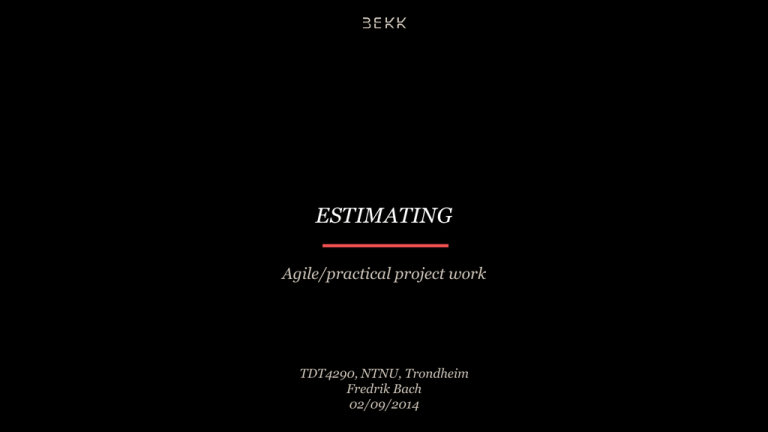
ESTIMATING Agile/practical project work TDT4290, NTNU, Trondheim Fredrik Bach 02/09/2014 INTRODUCTION Fredrik Bach Bekk Consulting • Project Manager at Bekk Consulting • Primarily custom software development • Lead for Project Management competency group at BEKK • We delver all necessary roles • “IT consultant” since 2001 • Believer in agile approach, but believe I have a balanced view • • Majority of our customers are large (in Norway) • • From business analysis to design to (dev) operations Relatively even split between private and public sector Most of our work is done in an agile manner AGENDA Some key concepts about estimates How we estimate at BEKK How do our customers feel about estimates Q&A ESTIMATES – KEY CONCEPTS What is an estimate? ESTIMATES – KEY CONCEPTS Estimate Target Commitment A preliminary calculation of the cost of a project Description of a desirable business objective Promise to deliver defined functionality at a specific level of quality by a certain date ESTIMATES – KEY CONCEPTS Relationship between estimates and plan Estimates != plan “The primary purpose of software estimation is not to predict a project’s outcome; it is to determine whether a project’s targets are realistic enough to allow the project to be controlled to meet them” ESTIMATES – KEY CONCEPTS An estimate is a range of possibilities ESTIMATES – KEY CONCEPTS An estimate is a probability ESTIMATES – KEY CONCEPTS An estimate is a probability ESTIMATES – KEY CONCEPTS Overestimation vs. underestimation • Underestimating causes a lot of problems • Reduced effectiveness of project plans • Estimates are already probably low • Results in low quality • Destructive late-project dynamics make the project worse than nominal • More meetings • More deliverables ESTIMATES – KEY CONCEPTS A little exercise ESTIMATES – KEY CONCEPTS 5 Questions • Surface temperature of the sun? • Latitude of Shanghai? • Area of the Asian continent? • The year of Alexander the Great’s birth? • Total value of US currency in circulation in 2004 ESTIMATES – KEY CONCEPTS 10 Questions ESTIMATES – KEY CONCEPTS Why are we bad at estimating? • Chaotic development process • Unstable requirements • Omitted activities • Unfounded optimism • Unfamiliar business area • Unfamiliar technology area ESTIMATES – KEY CONCEPTS Why do we need estimates? • Improved status visibility • Better coordination with non-software functions • Better budgeting • Increased credibility for development team • Early risk information ESTIMATING AT BEKK Project work vs. “application development” ESTIMATING AT BEKK - PROJECTS “Sales process” Decomposition & recomposition Top-down Relative ESTIMATING AT BEKK - PROJECTS “Sales process” – decomposition and recomposition • Quality of requirements from customer drives how we break down “what needs to be done” • First estimate is functional / best-case only • • • • • Ranges are used Estimates for non-functional requirements are added Team structure and plan is created (first for development only) • Calendar time depends on many factors (external, complexity) Other roles/functions are added to timeline (UX, PM, tester, graphic designer, etc.) Risk is evaluated • Very dependent upon contract form ESTIMATING AT BEKK - PROJECTS “Sales process” – decomposition and recomposition ESTIMATING AT BEKK - PROJECTS “Sales process” Top-down • Team structure proposed • Timeline proposed • Performed by sales/KAM based on experience • Note that at BEKK we have hands-on people who work in sales Relative • Involvement of similar projects ESTIMATING AT BEKK - PROJECTS “Sales process” Decomposition & recomposition -> 5 MNOK Top-down – 6 MNOK Relative – 4 MNOK ESTIMATING AT BEKK - PROJECTS Actual project work – Scrum - release planning • Create product backlog (user stories and epics) • Estimate backlog in story points • Planning poker • Prioritize user stories • Set iteration length • Estimate initial velocity • Create release plan ESTIMATING AT BEKK - PROJECTS Actual project work – planning poker • Estimate in points • Relative estimating • High-level estimates • “Agreement process” ESTIMATING AT BEKK - PROJECTS Actual project work – Scrum - iteration planning • At the start of the iteration • Whole team involved • Verify prioritized backlog • Estimate new stories / re-estimate those that feel completely wrong • Break-down stories into tasks and estimate (in hours) • Compare available time vs. estimates in hours • • Actual time vs. ideal time Commit to scope for iteration ESTIMATING AT BEKK – “APPLICATION DEVELOPMENT” • No “projects” – product focus • Pull-based system / no iterations • T-shirt estimates • S, M, L • Weekly workshop for estimating • One person gives estimate • Time estimates based on past data • Sometimes our customers want a project context in this environment • “Sales process” applies here WHAT DO CUSTOMERS THINK? 1. 2. 3. 4. 5. 6. 7. 8. Better to be approximately right than precisely wrong Better to overestimate (unless too expensive) They like estimates (sometimes too much) They mix estimates with commitments They often think good estimates are just a matter of effort They rarely appreciate complicated statistics “Internal” adjustments often take place Often say “why is this so expensive, when that was only…” ESTIMATES Q&A
